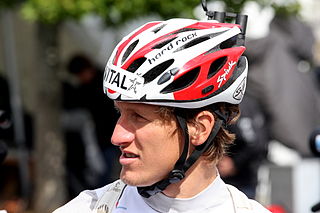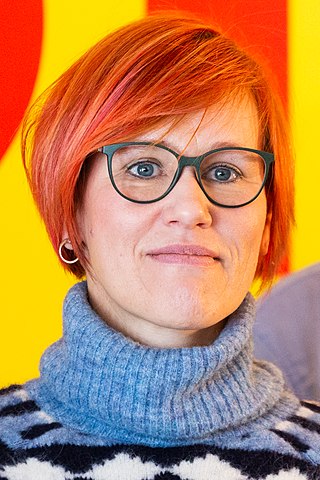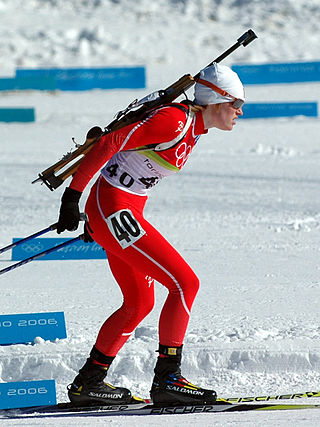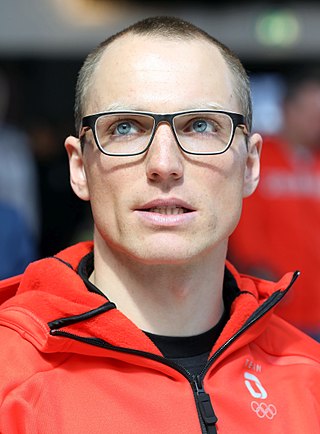
The biathlon is a winter sport that combines cross-country skiing and rifle shooting. It is treated as a race, with contestants skiing through a cross-country trail whose distance is divided into shooting rounds. The shooting rounds are not timed per se, but depending on the competition, missed shots result in extra distance or time being added to the contestant's total.

Ole Einar Bjørndalen is a retired Norwegian professional biathlete and coach, often referred to by the nickname, the "King of Biathlon". With 13 Winter Olympic Games medals, he is second on the list of multiple medalists behind Marit Bjørgen who has won 15 medals. He is also the most successful biathlete of all time at the Biathlon World Championships, having won 45 medals. With 95 World Cup wins, Bjørndalen is ranked first all-time for career victories on the Biathlon World Cup tour. He has won the Overall World Cup title six times, in 1997–98, in 2002–03, in 2004–05, in 2005–06, in 2007–08 and in 2008–09.

Lars Berger is a former Norwegian biathlete and cross-country skier.

Ilmārs Bricis is a former Latvian biathlete, who has participated in six Winter Olympics from 1992 to 2010.

Mark Kirchner is a German former biathlete.

Frode Andresen is a former Norwegian biathlete and cross-country skier.

Kati Wilhelm is a German former professional biathlete. Like most German biathletes she is also a member of the German Armed Forces (Bundeswehr) with the rank of master sergeant (Hauptfeldwebel). Wilhelm resides in Steinbach-Hallenberg, in the Federal State of Thuringia.

Michael Greis is a former German biathlete.
Peter Angerer is a former West German biathlete.

Antje Harvey is a former German cross-country skier and biathlete.

Frank Luck is a former German and, before 1990, East German biathlete.

Emil Hegle Svendsen is a retired Norwegian biathlete. He has won eight medals at Winter Olympics and five individual gold medals and seven relay gold medals at World Championships.

Biathlon debuted at the 1960 Winter Olympics in Squaw Valley, California with the men's 20 km individual event. At the 1968 Winter Olympics in Grenoble, the men's 4 × 7.5 km relay debuted, followed by the 10 km sprint event at the 1980 Winter Olympics in Lake Placid, New York. Beginning at the 1992 Winter Olympics in Albertville, women's biathlon debuted with the 15 km individual, 3 × 7.5 km relay, and 7.5 km sprint. A pursuit race was included at the 2002 Winter Olympics in Salt Lake City. The top 60 finishers of the sprint race would qualify for the pursuit event. The sprint winner starts the race, followed by each successive biathlete at the same time interval they trailed the sprint winner in that event. At the 2006 Winter Olympics in Turin, a mass start was introduced where the top 30 biathletes from the previous four events were allowed to start together for the competition.
Valeriy Alekseyevich Medvedtsev is a former Russian biathlete.

Tora Berger is a retired Norwegian biathlete and Olympic champion.
Henrik Forsberg is a Swedish former cross-country skier and biathlete who competed from 1988 to 2001. Competing in four Winter Olympics, he earned his best finishes at the 1992 Winter Olympics in Albertville in cross-country skiing with a fourth in the 4 × 10 km relay and ninth in the 10 km + 15 km combined pursuit.

Miriam Neureuther is a former German biathlete and cross-country skier. She has won an Olympic silver medal in cross-country skiing and two biathlon world championship titles, all in team events. Noted for her fast skiing performances, she won two junior world championship titles in biathlon in 2008 and 2009. Gössner was called up for the Nordic World Ski Championships 2009, where she was part of Germany's cross-country team claiming silver in the 4 × 5 kilometre relay.

Christoph "Sumi" Sumann is a former Austrian biathlete.

Vincent Jay is a former French biathlete and non-commissioned officer. During his career, he won two Olympic medals at the 2010 Winter Olympics in Vancouver - a gold in the sprint and a bronze medal in the pursuit. He was the first Frenchman to win an Olympic sprint Biathlon title. In the World Cup, he has fourteen podiums with two individual victories in Vancouver and two victories as part of relay teams.

Erik Lesser is a German former biathlete. In 2010, he ran his first single World Cup Race. At the 2014 Winter Olympics in Sochi, he won a silver medal at Men's individual. At the Biathlon World Championships 2013 he won a bronze medal with the German team in Men's relay.
















